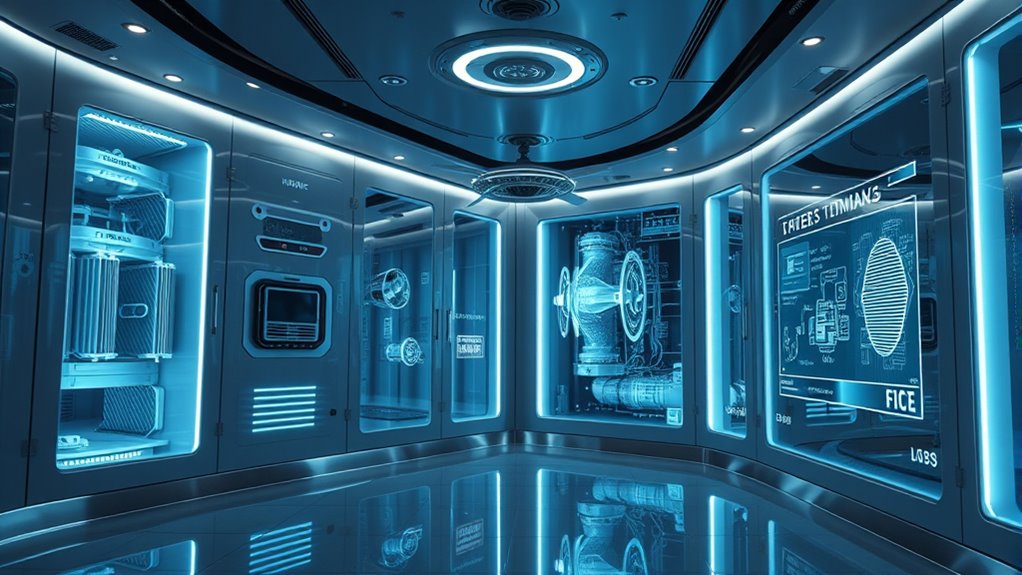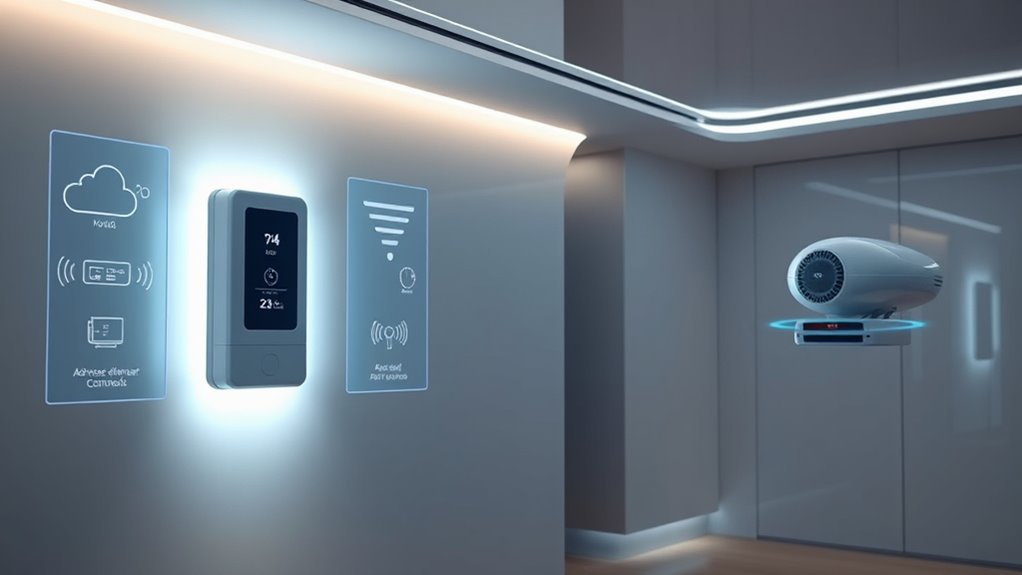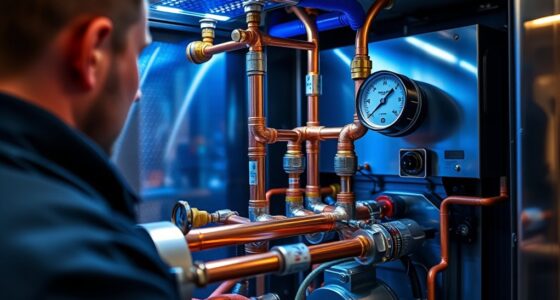The future of HVAC features smart ductless systems that offer targeted climate control, remote operation, and energy savings. AI integration helps optimize performance and adapt to your habits, making systems more intuitive. Solar cooling technologies harness renewable energy, reducing reliance on grid power and lowering emissions. These innovations lead to more efficient, environmentally friendly solutions that benefit your utility bills and comfort. Continue exploring to discover how these emerging technologies are transforming indoor climate management.
Key Takeaways
- Integration of AI and machine learning for adaptive, predictive climate control systems that optimize efficiency and user comfort.
- Expansion of solar cooling technologies using photovoltaic and thermal collectors to reduce reliance on grid electricity.
- Development of smart ductless systems enabling targeted, energy-efficient climate management with remote connectivity.
- Adoption of advanced sensors and automation for real-time occupancy detection and dynamic system adjustments.
- Increased focus on sustainability and environmental benefits through renewable energy integration and eco-friendly materials.

As technology advances, the HVAC industry is experiencing a wave of innovative solutions designed to improve energy efficiency, reduce environmental impact, and enhance indoor comfort. Among these advancements, smart ductless systems are gaining popularity for their flexibility and efficiency. Unlike traditional ducted units, smart ductless systems allow you to target specific zones in your home, reducing energy waste. These systems are equipped with Wi-Fi connectivity, enabling you to control your climate remotely via smartphone apps. You can adjust temperatures in individual rooms, schedule operation times, and monitor energy consumption, all in real-time. This level of control helps you maximize comfort while lowering utility bills. Additionally, smart ductless units often feature advanced sensors that detect occupancy and adjust settings automatically, further enhancing efficiency and convenience. Their sleek design also means less invasive installation, making them suitable for retrofits and spaces where ductwork isn’t feasible. Smart HVAC systems are also beginning to incorporate artificial intelligence to optimize performance and adapt to user habits more seamlessly.
Alongside smart ductless technology, solar cooling is emerging as a sustainable alternative to traditional air conditioning. Solar cooling harnesses the power of the sun to generate cooling energy, markedly reducing reliance on grid electricity and lowering carbon footprints. This technology typically employs solar thermal collectors or photovoltaic panels to power absorption chillers or vapor compression systems. You might find solar cooling integrated into existing HVAC setups or as standalone units in new builds. Its primary appeal is the potential for substantial energy savings and environmental benefits, especially in sunny regions. By utilizing renewable energy sources, solar cooling can operate efficiently even during peak summer months, when cooling demand is highest. While initial installation costs can be higher, government incentives and decreasing technology costs are making solar cooling increasingly accessible. It’s a forward-looking approach that aligns with global efforts to reduce greenhouse gas emissions.
Both smart ductless systems and solar cooling exemplify how the HVAC industry is moving beyond traditional solutions. They offer you options that are not only more energy-efficient but also smarter and more environmentally conscious. These innovations help you reduce your carbon footprint while maintaining ideal indoor comfort. As these technologies continue to evolve, expect even greater integration of artificial intelligence, machine learning, and renewable energy sources into your home’s climate control systems. Embracing these emerging solutions means staying ahead of the curve, benefiting from increased efficiency, lower operational costs, and a smaller environmental impact. The future of HVAC is undeniably leaning toward smarter, greener, and more adaptable systems that put you in control of comfort and sustainability.
Frequently Asked Questions
How Will AI Integration Impact HVAC System Maintenance?
AI integration will revolutionize HVAC system maintenance by enabling predictive analytics and autonomous diagnostics. You’ll notice fewer breakdowns because AI can anticipate issues before they happen and alert you early. This means maintenance becomes more proactive, saving time and costs. With autonomous diagnostics, systems can even perform self-repairs or adjustments, ensuring peak performance continuously. Overall, AI makes HVAC maintenance smarter, more efficient, and less disruptive to your comfort.
What Are the Environmental Benefits of New HVAC Tech?
You’ll see environmental benefits from new HVAC tech through recycling refrigerants, which reduces harmful emissions, and increased adoption of green refrigerants that have lower global warming potential. These innovations help cut down on ozone depletion and greenhouse gases, making your system more eco-friendly. By choosing these advances, you’re actively contributing to a cleaner planet while enjoying efficient, sustainable comfort in your space.
Are Emerging HVAC Systems Cost-Effective for Homeowners?
Emerging HVAC systems are like hidden gems—potentially cost-effective for homeowners. While a thorough cost analysis shows savings over time, installation challenges can be a hurdle, often requiring specialized skills or equipment. However, as technology advances and demand grows, prices tend to drop, making these systems more accessible. If you’re willing to navigate initial hurdles, you could enjoy long-term savings and improved efficiency, making these innovations worth considering.
How Do Smart HVAC Systems Improve Energy Efficiency?
Smart HVAC systems improve energy efficiency by using smart sensors to detect room conditions and adjust heating or cooling accordingly. They continuously monitor energy usage through energy monitoring features, helping you identify areas where you can cut back. With real-time data and automatic adjustments, you save energy and reduce costs. These systems optimize performance, prevent overworking equipment, and make certain your home stays comfortable while using less energy.
What Safety Concerns Are Associated With New HVAC Technologies?
You should be aware that new HVAC technologies can pose safety concerns like fire hazards, especially with advanced electrical components or faulty wiring. Chemical exposure is another risk if refrigerants or other substances leak, which could harm your health or cause damage. Always guarantee proper installation, regular maintenance, and use certified systems to minimize these risks and keep your environment safe and secure.
Conclusion
As you embrace these emerging HVAC technologies, you’re stepping into a future that’s more efficient, sustainable, and smarter than ever before. These innovations aren’t just upgrades—they’re revolutionizing how you experience comfort, saving energy, and protecting our planet. Think of it as harnessing the power to shape a cooler, greener world—your choices today ripple into a legacy of lasting change. Get ready to lead the charge into an era where technology and sustainability go hand in hand.









